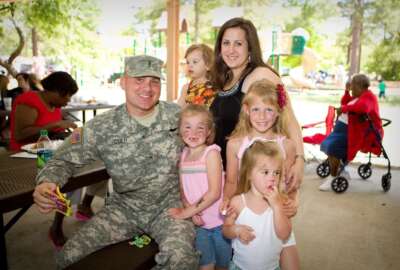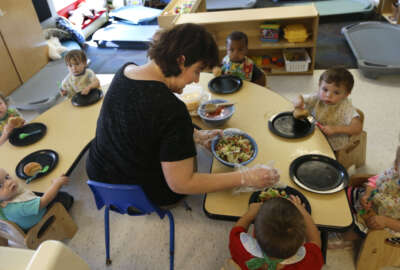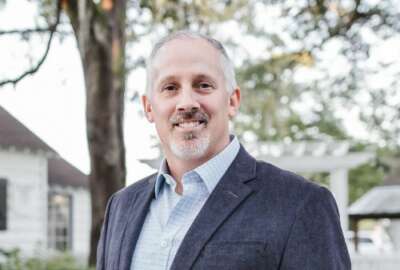
Coalition aims to provide assistance to military families
If the pandemic has been hard on families with kids in school, it's been especially hard on military families.
Best listening experience is on Chrome, Firefox or Safari. Subscribe to Federal Drive’s daily audio interviews on Apple Podcasts or PodcastOne.
If the pandemic has been hard on families with kids in school, it’s been especially hard on military families. Service members might be deployed. Spouses are more likely to be unemployed than average. And now they’ve got kids having to deal with the nightmare that is online schooling. The Military Child Education Coalition aims to help and it just got a big donation. For details, the coalition’s president and CEO Dr. Rebecca Porter joined Federal Drive with Tom Temin.
Interview transcript:
Tom Temin: Dr. Porter, good to have you on.
Dr. Rebecca Porter: Thanks, Tom. It’s great to be here.
Tom Temin: Tell us about MCEC. What do you do? Where do you operate? What’s your field of view here?
Dr. Rebecca Porter: Well, MCEC has been around for over 20 years, Tom. We started outside of Fort Hood, Texas, just north of Austin when a commander at the local installation, an assistant superintendent and some parents all got together and said military kids move too often and are not really incorporated and integrated in a way that’s helpful to them. And so they started 22 years ago, and now are a global organization that serves military children all over the world, US military children, and not only Army children, but Army, Navy, Air Force, Marine, Coast Guard, Reserves and National Guard — and even veterans families as well.
Tom Temin: And it’s safe to say that most of the children of military service members are not in DoD operated schools, but mostly in the local school districts of wherever they happen to be stationed. Correct?
Dr. Rebecca Porter: That’s true. And actually, it’s a common misconception that the military has its own schools for our children. Now, overseas, that’s the case and in some places in the continental United States, that’s true as well. But by and large 80 to 90% of military connected students are in their local schools or private schools nearby,
Tom Temin: What are the special challenges of these particular children and how do you help them?
Dr. Rebecca Porter: Military children move on out average six to nine times during their pre college years. And so that’s a lot of transferring credits, it’s a lot of changing curricula. And then there are the social emotional issues that are associated with that having to make new friends, or even extracurricular activities like sports, where they might get to another school system and have to recompete and reprove themselves every time they move.
Tom Temin: Yeah, so that is a tough one — and what are some of the ways and services that you offer to help the families and help the kids?
Dr. Rebecca Porter: What MCEC does is we approach things through several different venues. One is working with students directly. We train different schools to have a program called student to student and these are student led clubs in a school that sets out to welcome children into or students into a school and they don’t have to be military students to be welcomed by this club and they don’t have to be military to be in the club. But they’re supervised by a trained adult that we’ve trained. And they do things like make sure that a new student has somebody to sit with at lunch when they first start a new school. Another way that we make a difference for military kids is through our professional development program where we do training for educators, school counselors, the adults in the school system, who are really at the front lines of making sure that these kids get well integrated when they come to a new school. The other way that we make a difference for military kids is in training their parents on how to be great advocates for their own children. So we do workshops for military parents on how to do things like compile a portfolio of your children’s academic achievements and their syllabus from a school program that they did, so that when they get to the next school, it’s easier to see say, where are we, where do we fit into what’s happening in this school? Those are some of the ways that we make a difference for those military kids.
Tom Temin: Recently USAA gave you a $700,000 donation. Is that a big chunk for MCEC and what will that money help you do?
Dr. Rebecca Porter: It’s huge. It’s huge. Tom. We felt so humbled that they trusted us to give us a grant of that size. With $700,000, we’re going to be able to translate some of our parent programs into Spanish and are working right now on developing the first virtual parent to parent training in espanol. That’s huge for us. We’re also going to be able to stand up an on call transition specialist center, so like a call center where parents can call to get concierge service about transitioning their child from one school system to another. A lot of our programming over the last 20 years has been done face to face, we delivered a lot of trainings and workshops and in just different facilitated meetings, face to face. But obviously COVID kind of propelled us in a direction we had anticipated going anyway. But this grant from USAA is going to help us to convert a lot of our content to virtual delivery.
Tom Temin: Got it. Cause I imagined that the idea of being the new kid in a school is much worse when everything is virtual. Or maybe it’s better because you’ll never see those kids again if you get transferred in nine months.
Dr. Rebecca Porter: Well, I think it does present a new challenge. Military kids will tell you that if they’re grown now they’ll say, yeah, I remember whenever we moved, we would go door to door knocking on all the neighborhood houses doors, to say who’s got kids, who’s got kids our age. We can’t do that now. So what we’re having to do is really facilitate that kind of meeting new kids, meeting new neighbors, meeting other people in your school in a virtual environment. And the virtual school are kind of a hybrid, in some cases, really does present new challenges not only for the military children and for their parents, but also for educators who are having to learn how to not only teach the curriculum that they’ve always taught, but also in some cases, teach third graders how to put themselves on mute.
Tom Temin: What an interesting concept, too bad you can’t do it in person sometimes.
Dr. Rebecca Porter: Exactly.
Tom Temin: But do you find that if say a family moves from Fort Hood, and they go to another large installation, say a Fort Bragg or Fort Campbell or one of the whatever the service might be, a large Navy base — that the local school districts are familiar with this issue because very often they would normally have a large number of military families, even though it’s not the same families from year to year, but they would be there in the first place, and they would have experience with the whole concept of here’s a whole raft of new military families?
Dr. Rebecca Porter: It’s interesting that the awareness and the response to that and to the military children issues really varies from school system to school system. A school system, for example, like at Fort Leavenworth, Kansas has so many military kids almost almost exclusively military kids, that they’re very in tune with it. They’re very in tune with the rotation cycle and what’s happening. In other school systems, there are just so many so many kids, and so many who are not military connected, that there are just lots of issues going on. And so, sometimes what we do is just work with the school system to raise awareness about the issues and help advise them on how they can integrate military kids.
Tom Temin: So you operate a network of sort of train the trainers around the country sounds like.
Dr. Rebecca Porter: Yes, we do. Yes, we do. That’s really a lot of what our professional development is about. And then the parent issue, the parent programs that we have deal with from the parents perspective. So we have workshops. I mean, traditionally, we had, trainers teams in a place like Fort Bragg or in San Diego or El Paso, Texas. But now we’re able to do those workshops on Facebook Live. So really, it’s enabled us to reach out beyond just the confines of a local community.
Tom Temin: And the virtual idea has, I guess, maybe heightened the issue of does a given child have the technology necessary to be able to access all of these things? Is there a disadvantage for the military families or is there some mechanism by which they can get the tablets they need if they don’t have them?
Dr. Rebecca Porter: What we’ve been recommending to parents and to families is, you wouldn’t even think about this, but if you’ve got multiple people in your family trying to do school online at the same time, parents working online, you may need to increase your your internet plan. That’s not something where you just have money lying around that you’re going to throw at that. And so we’ve been encouraging military families to use some of the resources that are available, like Army emergency relief, or the Coast Guard and the Navy, they all have relief funds that can augment a family’s income to do something like increase their bandwidth.
Tom Temin: And outside of this really big grant from USAA, how do you generally get funds?
Dr. Rebecca Porter: A lot of our funding comes from corporate donors, and USAA happens to be our first corporate funder, and so we’ve got a long, great relationship with them. We do get some individual donations, but if you think about it, we’re trying to serve military families and they may not be the best positioned to be able to contribute to an organization like MCEC. We have in the past also had contracts with the different military services or school systems to provide services. But I think that that stream of funding is going to be extremely limited in the coming years just because of COVID and the budget cuts that are coming along with that.
Tom Temin: Dr. Rebecca Porter is president and CEO of the Military Child Education Coalition, MCEC. Thanks so much for joining me.
Dr. Rebecca Porter: It’s been my pleasure. Thanks for your interest, Tom.
Copyright © 2025 Federal News Network. All rights reserved. This website is not intended for users located within the European Economic Area.
Tom Temin is host of the Federal Drive and has been providing insight on federal technology and management issues for more than 30 years.
Follow @tteminWFED






